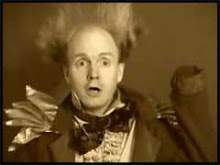- Get Caught-up in the Moment
- Make Problems
- Imagine the Worst
- Repeat the Same Tactic
- Use More Effort Than Necessary
- Persevere
- Prepare for Something Else
- Don’t Solve the Problem
- Add More Obstacles
- Treat Objects as Alive
- Treat People as Objects
- Imagine the Impossible
- Try the Impossible
- Compromise the Impossible
- Make Yourself Laugh
- Overreact
- Under-react
- Act Improperly
- Do What You're Not Supposed To Do
- Act Crazy
- Change Identity
- Do the Opposite
- Misinterpret/ Misunderstand
- Do the Impossible
- Follow the Rules
- Do things Backwards
- Use What's Available
- Take things literally
- Transform Objects
- Expand Space
Wednesday, January 30, 2008
30 Ways to Think Foolishly
Here's a list I used for a workshop I taught at QuestFest two weeks ago. I'm still developing these concepts, subtracting some and adding more. I'll explain each one in more detail over the coming months, but feel free to guess what each one means and then try to apply some to a problem or creation.
Sunday, January 6, 2008
Don't Solve the Problem
 This morning, I was working on the beginning of my show, where I enter through the curtain opening and get my thumb and then hand tangled in the curtain. I am trying to get on stage so that I can put signs on an easel and start the show.
This morning, I was working on the beginning of my show, where I enter through the curtain opening and get my thumb and then hand tangled in the curtain. I am trying to get on stage so that I can put signs on an easel and start the show.In past performances, I tried different tactics to get untangled until I have found one that works. Then I went to the easel and put the signs on, causing the poorly assembled easel to collapse.
Watching other performers in the past few months, I noticed they sometimes share this same pattern: do something, discover problem, solve problem, do something, discover new problem, solve problem, and so on. This rhythm can work fine, but there can also be a repetitive nature that lacks a build-up of dramatic tension.
What if the earlier problem or problems did not get solved? What if you still tried to reach your goal with the first problem still hanging around your neck?
In rehearsal this morning, I tried to get untangled, and when that just made things worse, I gave up on solving that problem, went as far as I could downstage with my right hand still caught in the curtain, and reached as far as I could with my left arm to put the signs on the easel, which of course collapsed. I used my feet to pick up the easel, put the signs between my legs so I could reassemble the easel with my left hand, and I noticed that my right hand had gotten free while I was preoccupied with the easel.
For me, this was much more interesting than the previous version. It was also more fun and challenging. Next time I'll see if I need both hands to get the easel back together and if my hand can stay stuck even longer.
Foolish Question for your physical comedy routine or even for a problem in your life that needs solving: Do you really have to solve this problem to reach your goal? How can you move forward with this handicap?
Subscribe to:
Posts (Atom)



